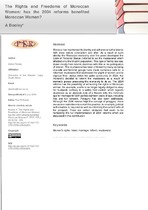The rights and freedoms of Moroccan women: has the 2004 reforms benefited Moroccan women?
Abstract
Morocco has maintained its identity and adherence to the Islamic faith since before colonialism and after. As a result of such identity the Moroccan monarchy over the years developed the Code of Personal Status (referred to as the mudawana) which affected only the Muslim population. This type of family law was drawn mostly from Islamic doctrines with little or no participation of women. The mudawana has been criticised by many as being one-side and feminist groups have made numerous calls for a reformed mudawana that addressed the plight of women and to improve their status within the wider community. In 2004, the monarchy decided to reform the mudawana as a result of women’s groups pressuring the monarchy to do so. The 2004 reforms has the possibility of enhancing the rights of Moroccan women, for example, a wife is no longer legally obliged to obey her husband, contrary to a widely-held custom which regards obedience as an absolute duty of a Muslim wife, the minimum age for marriage for both parties eighteen years of age, including free and full consent. Polygyny has also been addressed. Although the 2004 version kept the concept of polygyny, there are severe restrictions to curtail this practice, for example, judicial authorisation is required as well as informing the current wife of the prospect. There are certain obstacles that seem to be hampering the full implementation of 2004 reforms which are discussed in this contribution.

